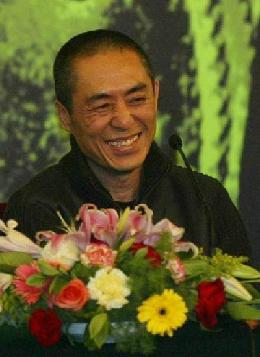Zhang Yimou -- An Internationally Acclaimed Filmmaker
After graduation, these first post-Cultural Revolution students (who came to be known as the "fifth generation" Chinese cinema directors) were posted to regional films studios. Zhang Yimou was assigned to the Guangxi studio, which had been founded in 1974, towards the end of the Cultural Revolution. Lacking any clear production policy, the studio was open to suggestions from its new recruits who, in 1983, advocated the establishment of a Youth Production Unit.

This recommendation was readily accepted, and a young production crew, including Zhang Junzhao as director and Zhang Yimou as photographer, embarked on their first picture, One and The Eight, based on a narrative poem set during the war against the Japanese. The film ran into considerable trouble with the authorities and had to be amended in terms of plot and characterization before securing a release. The look of the film, however, remained intact, and it was the striking photographic quality achieved by Zhang Yimou that attracted most acclaim. Zhang has explained that they consciously reacted against the uniform lighting of most contemporary Chinese films and sought a harsh, monochromatic appearance appropriate to the story of prisoners offered a "Dirty Dozen Style" opportunity to redeem themselves.
Following One and The Eight, Zhang Yimou acted as director of photography on the first two films of his contemporary at the Beijing Film Academy, Chen Kaige. The first of these, Yellow Earth (1984), effectively launched the fifth generation outside China and was much commended for its innovative camerawork, in which small figures were photographed against vast expanses of sky. Chen Kaige's second film, The Big Parade, underwent extensive censorship and revision but again Zhang Yimou's camerawork, capturing the agonies of "square-bashing" in the grueling sun -- this time in widescreen -- was much admired.
Zhang Yimou had long wanted to direct himself and was able to do so by transferring in 1985 from Guangxi studio to the Xi'an studio, then run by the imaginative and entrepreneurial Wu Tianming. Wu initially invited Zhang to join him in Xi'an (where he had been born) to photograph his own upcoming production Old Well. Zhang agreed on the understanding that he could then direct his own first film. In the end, Zhang Yimou not only photographed Old Well, but played the leading role himself, winning Best Actor Award at the Tokyo International Film Festival. (Though acting is only a subsidiary pursuit for Zhang Yimou, he also played the lead in the 1990 Hong Kong costume drama A Terra Cotta Warrior, opposite Gong Li).
|

